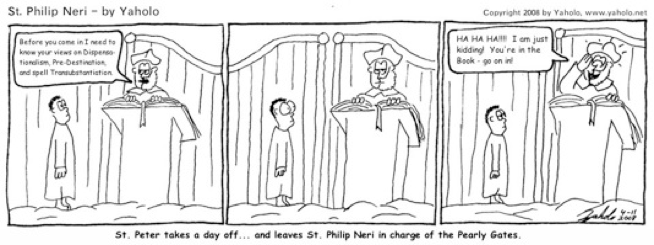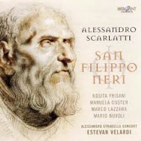_________________________________________________________________________________________
For more about me, click on the image
St. Philip Neri & the Oratory
“A joyful heart is more easily made perfect than a downcast one” (1)
In the Catholic Church there are not many Saints where they play jokes on. St.Philip possessed a playful humor, combined with a shrewd wit. Recently I found on internet a cartoon. That even today people are inspired to make fun of the Church by using St. Philip, means a lot for me. Nonetheless his wit, he became one of the protagonists of the Catholic Reform in the 16th Century. The man became even the second patron of the city of Rome after St. Peter. And that for a man, who in the most difficult times of the Catholic Church, when the anglicans separated of the Church, Luther, Zwingli, Calvin protested against the power of the Church of Rome, he managed to change the church from within. The often say, if you want to change politics, become politician. And that was what he did. His Saintly example made him the dean of the saints of the Catholic reform in the 16th century. For what was going on in those days, read my article
“Protestantism and Catholic Reform”
Even protestants loved him. Goethe, in both his “Journey’s in Italy” couldn’t resist to dedicate twice an entire chapter to the man. If you’re up to it (quite difficult to read), read the next link: “Dare to be happy”. It’s about the ethics of Goethe. But who was the man and saint, called the Joyful Saint by Goethe and so much praised by a protestant, as so many others today?
Thomas a Kempis- Ruysbroeck, the mystics of the Medieval.


